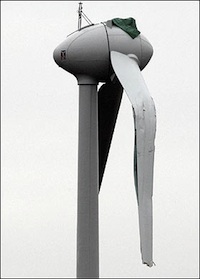This article is more than 1 year old
Minister blows away plans for more turbines
Everyone off the gravy train
Comment It looks as though the wind energy boom is over. UK energy minister Greg Barker has hinted at a significant change in government strategy - cutting subsidies for the deployment and operation of environmentalists’ favoured technologies.
The climate change minister hinted that R&D handouts would continue, but for the wind lobby the party appears to be over. Barker said the UK has all the wind turbines it needs: “Far from wanting thousands more, actually for most of the wind we need... they are either built, being developed, or in planning,” he told the Sunday Times [paywall].
Barker says the policy he inherited from Labour was "unbalanced" – but after the coalition was elected in 2010, the administration continued it with gusto, outlining plans for 10,000 industrial onshore wind turbines and 22,000 offshore.
Until now.
“There is a requirement to rethink the economics of green. We have to have a more nuanced and sophisticated policy. Basically, that means reducing costs quicker, looking to commercialise sooner, and thinking more carefully about the use of public subsidy,” said Barker.
Other reports suggest that Renewable Obligations Certificate (ROC) subsidies, which cost £400m a year, will be scaled back. ROCs oblige energy suppliers to buy a set percentage of their energy from certified renewable sources.
Not all renewable energy is inefficient and operationally expensive – but wind carries huge penalties over conventional sources. In addition to a high capital cost, particularly hooking them up to the grid, wind produces electricity when it isn’t needed and often fails to produce it when it is.
As the El Reg energy desk explained last summer:
There is little point building more wind turbines above a certain point: after that stage, not only will they miss out on revenue by often being at low output when demand is high, but they will also miss out by producing unsaleable surplus electricity at times of low demand. The economic case for wind – already unsupportable without the ROC scheme – will become even worse, and wind will require still more government support.

Consumers bore the cost of wind’s intermittency and operators were paid when not producing any electricity. In one case an operator asked to be paid ten times as much to close the turbines as they would have received operating them for contributions to the National Grid. Those payments, hidden until this year, rose 13,733 per cent in 2011.
Other reports say large sections of the "Green Deal" – a corporate welfare programme for retailers and services companies such as B&Q and the home insulation lobby - may also be axed.
Proposed regulations would oblige householders to make thousands of pounds of additional expenditure when changing a boiler and borrow from a government fund. “One seamless offer to the consumer,” as DECC describes it.
As a simple voluntary financing programme to encourage energy efficiency and improve the UK's housing stock, it's hard to imagine any controversy. But the mandatory aspect of the programme, and relaxation of supplier obligations and removal of an independent complaints service, made it appear suspiciously like a producers' racket. ®
